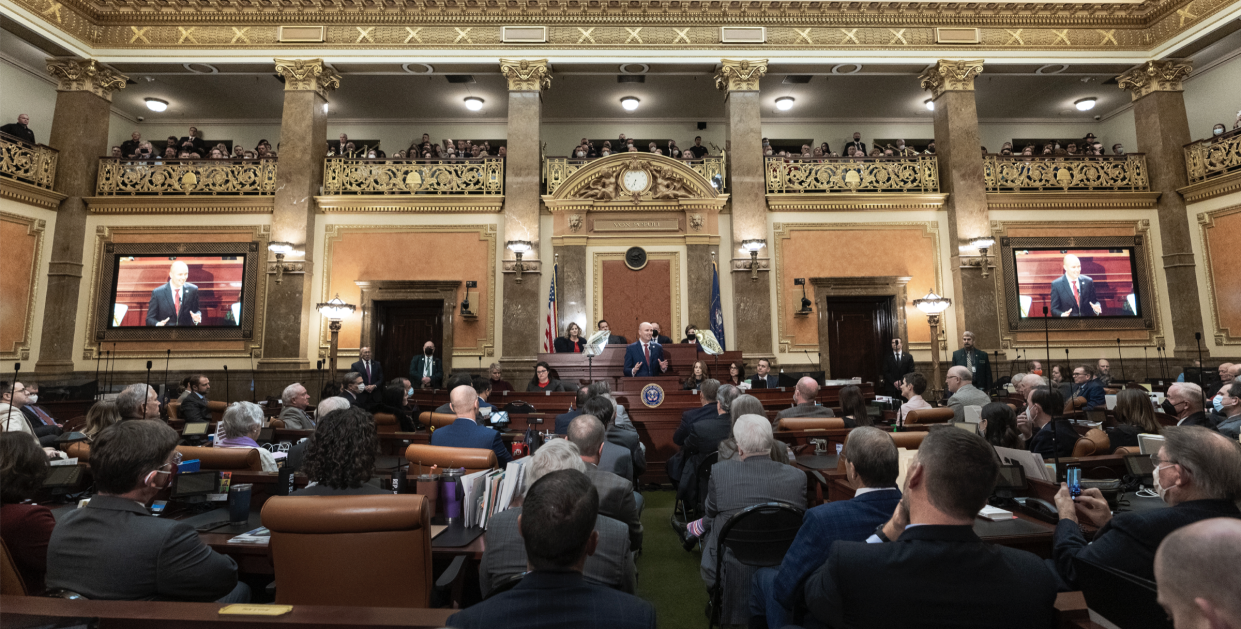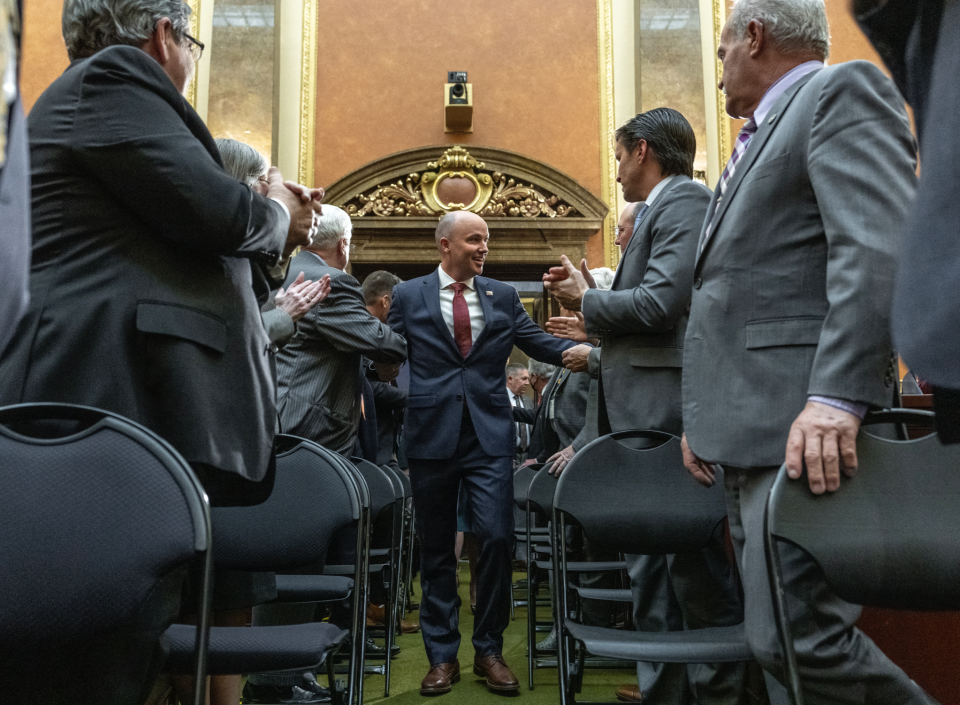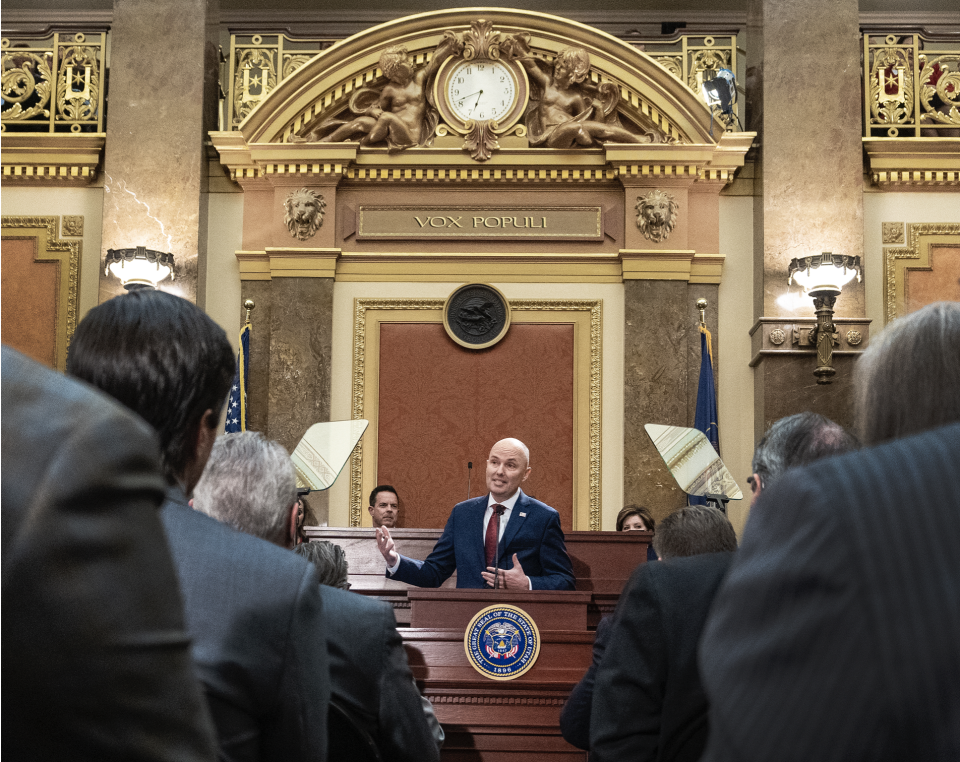Gov. Cox speaks on taxes, housing, water and hope in his state of the state address

In his annual "state of the state" address on Thursday, Utah Gov. Spencer Cox’s speech focused on pressing issues, big legislative promises and talking in a hopeful way for the future of the nation’s fastest-growing state.
The pandemic and Utah
The speech was optimistic about the future but started off by addressing the coronavirus pandemic, something the state has been dealing with since before Cox was sworn into office. Despite Utah having the third-worst COVID-19 case rate per 100,000 residents in the nation, Cox spoke confidentiality about the pandemic within the state and didn’t focus on the case count.
“I am encouraged that Utah currently has the 6th-lowest hospitalization rate in the nation — and that our rate is less than half the national average,” Cox said.
The national average for COVID-19 hospitalizations per 100,000 residents is 48, while Utah’s is 23. Cox continued to say experts have assured him the worst of the current surge in coronavirus due to the omicron variant is coming to an end in the near future and pointed to declining case rates in Summit County as an example the rest of the state will follow.
Although Summit County has one of the highest vaccination rates in the state with 81% of its residents being fully vaccinated, Southwest Utah only has a fully-vaccinated rate of just under 46%, according to data kept by the Utah Department of Health.
Cox didn’t mention masks or vaccines in his remarks about the pandemic, despite several bills in the state legislature that would essentially take away the option for mask or vaccine mandates. One bill written by southern Utah Rep. Walt Brooks, R-St. George — HB 60 — would ban most public spaces from being able to ask about a person’s immunity status.
The focus on the pandemic then shifted to thank medical workers and teachers, two professions that have often been put at the front of conflicts over the response to the pandemic. Cox issued a clear stance on what the future of education should look like in the pandemic and asked all Utahns to find “common ground” on in-person education.
“Our children need us to be strong,” he said. “They need us to point to a hopeful future. And they need to be in school, in person, face-to-face with their friends and teachers.”
This comes as the Utah Legislature is working to end the test-to-stay program within the state, which set parameters for how schools in the state should handle COVID-19 outbreaks. This program was called ineffective due to the high transmissibility of the omicron variant, according to state leaders.
The bill that would end test-to-stay — HB 183 — has been approved by both the Utah House and Senate despite no public hearings being held over the bill. The Senate passed an amended version meaning it will need to be approved again by the House. This is likely to happen since the bill passed the House on Wednesday with a vote of 57-17.
In a pre-recorded message that played after the governor’s speech, Utah Democrats pushed back against some positions taken by Cox especially around the pandemic saying lawmakers can’t decide the end of coronavirus.
“Our communities have been hard hit by the current COVID-19 variant,” said Sen. Karen Mayne, D-West Valley City, the Senate minority leader. “After nearly two years now, we are all sick of this pandemic. But as lawmakers we cannot simply legislate the virus away.”
“As Democrats, we will not back down from pushing data-driven policies that will keep all your chances safe and protected,” said Rep. Brian King, D-Salt Lake City.
Big Promises on education and social spending

Cox acknowledged that the changes to how the state is handling COVID-19 in schools have been difficult for teachers.
“To those teachers with us tonight, I know that you are on mile 42 of what was promised to be a 26.2 mile COVID marathon,” he said. “And while we can never thank you enough, I do believe that we can pay you better.”
This belief led Cox to propose more than $970 million in education funding for the near future, with that cash being focused on spending towards students that are disadvantaged or at-risk. Cox also pointed to legislation being drafted by Rep. Adam Robertson, R-Provo, that would save the state $55 million, according to Cox, by eliminating all school fees for coursework required to graduate.
Currently, this bill isn’t available for the public to read.
Democrats in their message said this investment was needed even before the pandemic started and pointed out Utah remains the state that spends the least money per pupil among the 50 states.
“Investing in children should be another top goal this session,” Mayne said.
But this wasn’t the only spending meant to help low-income Utahns. The governor touted in his speech how last year $100 million was used for tax relief on seniors — through a social security tax credit increase pushed through by Brooks — as well as veterans and families. Cox again pushed for $160 million to be used for a grocery tax credit for low-income families.
It’s unclear whether this grocery tax credit would be put into effect since the Republican Caucus has stated a desire to cut the income tax in the state down by .1% to 4.85% a move that would cost Utah an estimated $160 million in tax revenue.
More: Southern Utah lawmakers' legislation: Tax cuts, vaccination status privacy, death penalty update
But Utah Senate President Sen. Stuart Adams said in response to the speech that negotiations around how this money will be spent are open.
“While we may have different opinions on how to allocate some funds and provide tax relief, I look forward to collaborating and working with Gov. Cox and Lt. Gov. Henderson towards Utah’s collective vision,” read Adams’ statement.
Democrats said they’re against any income tax cut but rather support targeted cuts for certain groups like seniors, veterans and those on fixed incomes. They also support a repeal of the state’s food tax, which they call “regressive.”
Republican legislative leaders and Cox credited Utah’s large budget surplus and growing economy as reasons for setting aside this $160 million for various causes. But Cox doesn’t want the investments used by this surplus — which is $614 million — to just be limited to spending on education and families, he also wants to invest in projects that will address Utah’s historic drought.
Utah’s drought and plans to address it
A vast majority of the state, 98%, faced extreme drought conditions in 2021 and while in response some cities stopped issuing building permits, most just relied on voluntary conservation measures to address water issues.
“Utahns stepped up in a big way, conserving billions of gallons of water to help us through this crisis,” Cox said.
In 2021, from January to October, the city of St. George used 2% less water from the previous year despite the city growing by 6%, according to St. George Mayor Michele Randall.
Despite encouraging numbers on conservation, Cox said the state needs to do more on water since it will be the “greatest limiting factor” for the state’s growth. Cox asked for public support for bills sponsored by Reps. Ray Ward, R-Bountiful, and Robert Spendlove, R-Salt Lake City to further improve conservation rules.
But Cox didn’t mention any controversial projects in the state that relate to water, including southern Utah's two largest proposals, the Lake Powell Pipeline and the Pine Valley Pipeline projects.
Challenges with growth outside of water
Even with the state’s growth being dependent on an uncertain water future, Cox gave a warm welcome to Utahns that just moved to the state driving the state’s rapid growth but gave a light-hearted request to new residents to keep the current style of governance in place.
“We are happy you have chosen to call this your new home. We have so much to learn from you,” he said. “If I may make one small request: Please don’t attempt to change us into the place you just left. Utah has maintained a high quality of life and abundant opportunity for our residents through practical, common-sense governance, and it is absolutely critical that all of us do everything in our power to keep it that way.”
One main problem governance needs to address to continue to accommodate this growth is to address the state’s housing affordability crisis. Like the other topics in his speech, Cox backed the work being done by certain legislators, for housing he singled out work being done by Reps. Joel Ferry, Steve Waldrip, Joel Briscoe and Sen. Jake Anderegg.
More: Sizzling St. George housing market hits pricey milestone: Median sales price now $500,000
So far out of this group of legislators only two, Anderegg and Waldrip, have filed and sponsored a bill specifically relating to housing affordability, the bill is HB 36 and would create a Housing Affordability Subcommittee.
Cox said the problem around housing affordability is causing problems along with the Wasatch Front that has been experienced for a long time more rural areas of the state
“For the first time ever, people on the Wasatch Front are experiencing something that those of us from rural Utah have felt for far too long: the terrible realization that our kids and grandkids might not be able to live near us. In rural Utah that happens because of a lack of jobs. Along the Wasatch Front, it’s due to the unsustainable increase in housing prices,” said Cox.
“We have to get this right. We must act now,” he continued.
Democrats agreed on that point.
“As a state and as a legislature, we have simply not made the investments in housing that are needed,” said King. “The Governor's proposed $220 million for affordable housing, including funding for housing for very low-income Utahns would be a step in the right direction.”
More: How Washington County's housing prices hurt area residents: A Spectrum News podcast
Cox then pointed to how there will be more action to improve Utah’s already robust economy, including an unveiling of 26 new policies related to workforce development, industry-friendly education, housing availability, and improving both international trade and rural economy.
One area that could be a focus in the future are mining resources within the state, Cox mentioned how the state has 28 out of the world’s 35 “most critical minerals.” Which is an echo of a resolution, SCR 03, debated on the Utah Senate floor that asks government officials to take advantage of the mining resources in the state which were valued at $3.7 billion, according to the filed resolution.
“We can show the country and the world how to responsibly harness the power of our precious natural resources while being wise and protective stewards of this land that we cherish,” said Cox.
Elections and political discourse
National politics did play a role in Cox’s speech but his words included defending Utah’s election laws, saying every year he was lieutenant governor a law shoring up the state’s elections was passed. He promised Lt. Gov. Deidre Henderson would continue this tradition and would propose another election law in order for Utah to remain a “model” in the country for elections.
“As a conservative, I believe that we should always work to make constitutional rights more accessible, not less,” said Cox.

The state democrats echoed this response in their pre-recorded response to the speech.
Cox didn’t push back against any actions taken by the Republican-dominant Legislature but did issue a proclamation to those assembled before him about what he wasn’t interested in.
“I sometimes worry that we waste too much valuable time on things that tear us apart and ultimately don’t matter. You may have noticed last year that I have very little interest in fighting the so-called culture wars,” he said.
The current political climate, which is driven by social media and cable news channels, is prone to take things to extremes and create culture wars, according to Cox, who said politics are becoming more national than local, which is a “very bad” thing.
“The easiest thing in the world is to watch MSNBC or Fox News and simply adopt all of their talking points and policies,” he said. “It’s the most tried and true way to get likes on social media. It is also terribly destructive. And it certainly isn’t leadership.
“But that’s not us. That’s not Utah. At least it’s not Utah at its best.”
Cox then talked hopefully about the ability of residents to overcome these challenges and lead the state.
“I firmly believe in my heart that if America is the last great hope of the world, then Utah is the last great hope of America,” he said.
Cox then finished his speech by addressing different groups of Utah that have been put in the cross-hairs of public scrutiny in the past.
“Here in Utah, we proudly protect religious liberties and love and proudly protect our LGBTQ neighbors," he said. "We deeply love our refugees and immigrants from all parts of the world and deeply respect the rule of law.
“We share a love of community while holding individual freedoms as sacred," he continued. "We protect our unborn and support our single mothers and children facing poverty and trauma. And we fully stand behind our beloved people of color and our beloved people in law enforcement."
He also gave high-minded quotes from former presidents, one a Republican — George W. Bush — and one a Democrat — Bill Clinton — to encourage both sides of America’s predominant political parties to understand each other.
“To my Republican friends, who feel like the world is moving too quickly and the other side is trying to change our very way of life: I agree with George W. Bush, who said, 'Too often we judge other groups by their worst examples while judging ourselves by our best intentions.' Please don’t give up on the idea of America," Cox said.
“And to my Democratic friends, who worry that our country is broken beyond repair because we are failing to take care of each other: I agree with Bill Clinton, 'There is nothing wrong with America that cannot be cured by what is right with America.' Please don’t give up on the idea of America."
Cox ended his 20-plus minute speech with a call to action for residents in the Beehive State.
“Let’s do the big things. Let’s do the things that matter. Real work. Hard work,” he said.
Sean Hemmersmeier covers local government, growth and development in Southwestern Utah. Follow on Twitter @seanhemmers34. Our work depends on subscribers so if you want more coverage on these issues you can subscribe here: http://www.thespectrum.com/subscribe.
This article originally appeared on St. George Spectrum & Daily News: Gov. Cox speaks taxes, housing, water and hope in annual speech

